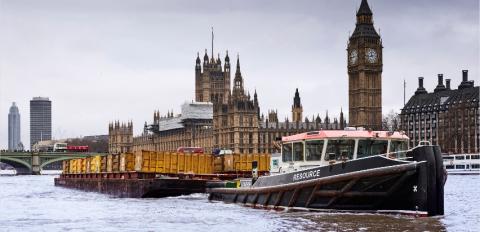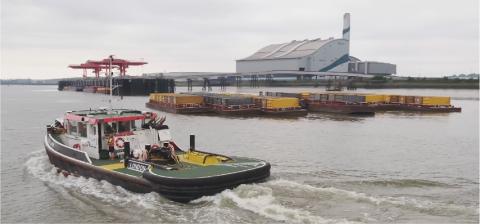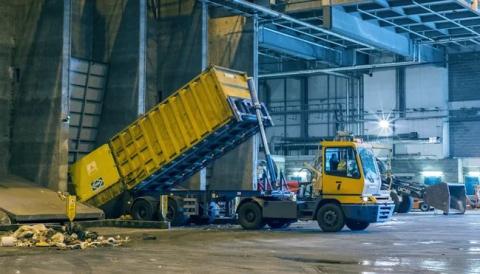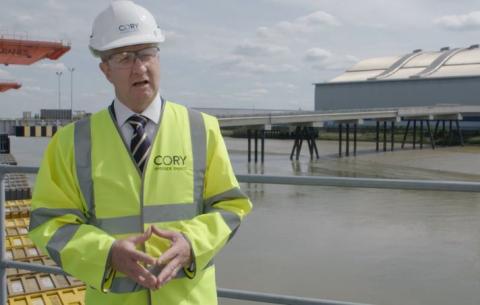Breadcrumb
Cory Riverside Energy
Cory Riverside Energy is a leading resource management, recycling, and energy recovery company. It operates one of the largest operating Energy from Waste (EfW) facilities in the United Kingdom, with a unique river-based infrastructure on the Thames for delivering waste.
The investment in numbers
- 741,500 tonnes of waste processed in 2019
- 100,000 avoided truck trips due to use of barges and tugs
- 160,000 homes with the potential to be powered by the Cory EfW facility
- 166,000 tonnes of C02 emissions avoided compared to emissions from landfill
Cory’s value creation is all about generating a resource efficient economy for London from London’s waste; providing safe, secure, affordable and sustainable supplies of energy and materials from renewable and other sources. The benefit of this approach is that it stops waste being buried in landfill or exported abroad for others to deal with, while ensuring that useful products are derived from the treatment process. Cory create value through segregating waste which can be technically and economically recycled; and by generating energy from non-recyclable waste. In the process of energy generation, further value is created from by-products such as metals and process residues that are collected and used in construction materials.
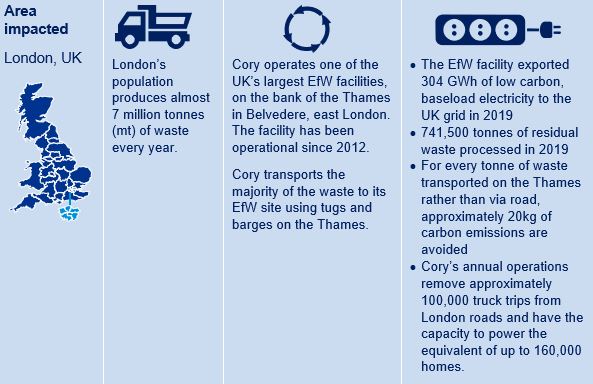
Situation
London’s population is 9 million and the city produces over 7 mt waste annually. Of this, around 30% (2.1 mt) is recycled. In 2016, EfW treated 1.95 mt out of a total 4.42 mt of residual waste in London, while over 2.3 mt of London’s residual waste was disposed of in landfill (1.49 mt) or exported (0.86 mt), leaving significant scope for further progress in recycling and energy from infrastructure. London’s growing population and the UK’s net zero targets imply that the city will also need a reliable supply of sustainable electricity in the future.
Action
Cory Riverside Energy began as William Cory and Son Limited in 1896 and the company was primarily involved in the coal trade. In 1979, Cory acquired Thames & General Lighterage making the company the largest carrier of waste over the Thames. Through the 1980s, the company sold its coal and oil distribution business, to become a pure waste management company under the brand Cory Environmental. Starting with a Greater London Council (GLC) contract to dispose of half a million tonnes of waste, Cory Environmental progressively signed on waste authorities for waste disposal services. In 2002, Cory secured a GBP 700 million 30-year contract with the Western Riverside Waste Authority (WRWA) including a GBP 5 million waste minimization and awareness campaign and development of a Material Recycling Facility (MRF), which segregates and processes c. 70,000 tonnes of recyclable waste per annum for onwards recycling by third parties into useful products. As well as operating the MRF, Cory operates two reuse and recycling centres on behalf of the Western Riverside Waste Authority (serving four local boroughs) and the London Borough of Tower Hamlets, allowing the local communities to responsibly dispose of their unwanted goods. Cory’s Riverside Resource Recovery facility, one of the UK’s most efficient energy recovery plants, began operating in 2012. The facility can process up to 785,000 tonnes of municipal and commercial waste every year. In 2018, Cory acquired Thames Ship Repair Services, a shipping maintenance company, based in Kent allowing Cory to maintain its fleet while continuing to services to third parties. As a first step, Cory transports residual (non-recyclable, ‘black bag’) waste from various London river-based waste transfer stations to the resource recovery facility via barges and tugs on the Thames. Energy is produced from the incineration of this waste. Metals are extracted for recycling, and the by-products from the incineration process, Incinerator Bottom Ash (IBA) and Air Pollution Control Residue (APCr) are processed into aggregate and used as roading and construction materials.
Financing Model: Consortium
The Dalmore-led consortium took over 100% ownership of Cory Riverside Energy on 28 June 2018. The owners and their shareholdings are:
- Dalmore Capital, through its DCF3 fund, alongside co-investors from the UK, US and South Korea – 55.8%
- Semperian Capital Management, on behalf of Semperian PPP Investment Partners and TfL Pension Fund – 22.7%
- Fiera Infrastructure, through its Eaglecrest fund – 11.8%
- Swiss Life Asset Managers, through fund Swiss Life Funds (Lux) Global Infrastructure Opportunities II 9.8%The transaction received GBP 553.8 million in debt funding; BNP Paribas was the mandated lead arranger.
Benefits to the environment & circular economy
Cory Riverside Energy can process up to 785,000 tonnes of residual waste per year. This generates around 550 GWh of electricity per annum, enough to power the equivalent of 160,000 houses.The facility participates in the circular economy by sending metals, Incinerator Bottom Ash (IBA) and Air Pollution Control Residue (APCR) to the construction sector while depending on municipal and construction waste for feed. Innovation & Infrastructure Cory is a leading operator of an EfW facility, which can process up to 785,000 tonnes of waste per annum and operates with a best in class R1 recovery rate as accredited by the Environment Agency. The company is also in the planning process to develop a new facility at Belvedere, the Riverside Energy Park, which if constructed will be capable of processing up to a further 805,000 tonnes of non-recyclable, black bag waste and producing energy for the equivalent of a further c.140,000 homes per year. The size of the Riverside Energy Park project deems it to be a Nationally Significant Infrastructure Project.
Improving London’s Air Quality
• Cory’s operations result in approximately 100,000 fewer journeys by truck per year as the majority of waste is transported from the transfer stations to the EfW facility by barges and tugs • c212 kg of carbon avoided per tonne of waste processed implies around 166,000 tonnes of CO2 avoided annually • Barges produce 4-6x less NO2 compared to road transport • The emissions from the Riverside EfW facility are well below its permitted limits, with emissions of PM10 being c. 93% below the permitted level. Cory is investigating ways to reduce the emissions from its operations further through new technologies and changed ways of working • Overall, Cory’s operations support London’s ambition to become a sustainable city in line with UN SDGs Investing in People • Cory offers around five apprenticeships every year and apprentices represent 5% of Cory’s workforce; approximately 40% of Cory’s employees either are or have been apprentices • Since the apprentices are encouraged to learn by doing, they provide important contributions to Cory’s operational strategy • Cory’s overall staff turnover is less than 10%. At the end of 2018, 10% of Cory’s workforce had over 20 years of service • The company’s priorities going forward are: o Focus on mental health and wellbeing, including financial wellbeing o Continued focus on learning and development o Supporting STEM development skills in local schools
Partnerships
• Cory’s waste input originates from both municipal and commercial partners. • Cory’s partners process the by-products (ash and air pollution control residue) into useful aggregates for the roading and construction industries • Cory has partnered with Joint Heating Scheme Working Group, which includes; London Borough of Bexley, Greater London Authority and Peabody Homes, to develop a district heating scheme in Bexley that will be heated using waste heat from the Riverside EfW facility
